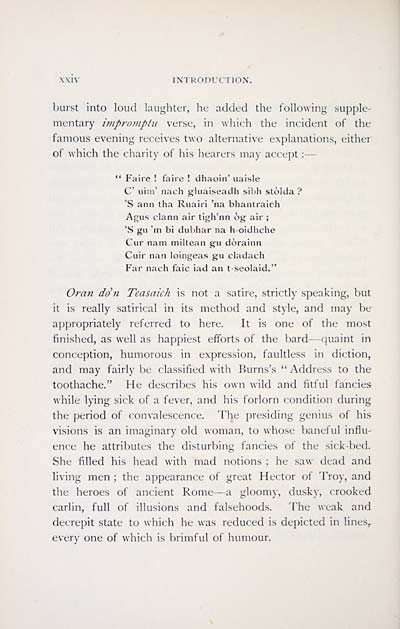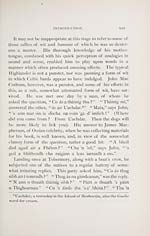Hew Morrison Collection > Poems and songs of John MacCodrum, Archibald MacDonald, and some of the minor Uist bards
(42)
Download files
Complete book:
Individual page:
Thumbnail gallery: Grid view | List view

WIV INTkOJ)UCT10N.
burst into loud laughter, he added the following supple-
mentary impromptu verse, in which the incident of the
famous evening receives two alternative explanations, either
of which the charity of his hearers may accept : —
" Faire ! faire ! dhaoiii' uaisle
C uim' nach gluaiseadh sibli slòlda ?
'S ami tha Ruairi 'na bhamraich
Agus clann air tigh'nn òg air ;
'S gii 'm bi dulihar na hoidhche
Cur nam miltean g^u dòraiiin
Cuir nan loingeas gu cladach
Far nach faic iad an tseolaid."
Oran do7i Teasaich is not a satire, strictly speaking, but
it is really satirical in its method and style, and may be
appropriately referred to here. It is one of the most
finished, as well as happiest efforts of the bard — quaint in
conception, humorous in expression, faultless in diction,
and may fairly be classified with Burns's "Address to the
toothache." He describes his own wild and fitful fancies
while lying sick of a fever, and his forlorn condition during
the period of convalescence. The presiding genius of his
visions is an imaginary old woman, to whose baneful influ-
ence he attributes the di.sturbing fancies of the sick-bed.
She filled his head with mad notions ; he saw dead and
living men ; the appearance of great Hector of Troy, and
the heroes of ancient Rome — a gloomy, dusky, crooked
carlin, full of illusions and falsehood.s. The weak and
decrepit state to which he was reduced is depicted in lines^
every one of which is brimful of humour.
burst into loud laughter, he added the following supple-
mentary impromptu verse, in which the incident of the
famous evening receives two alternative explanations, either
of which the charity of his hearers may accept : —
" Faire ! faire ! dhaoiii' uaisle
C uim' nach gluaiseadh sibli slòlda ?
'S ami tha Ruairi 'na bhamraich
Agus clann air tigh'nn òg air ;
'S gii 'm bi dulihar na hoidhche
Cur nam miltean g^u dòraiiin
Cuir nan loingeas gu cladach
Far nach faic iad an tseolaid."
Oran do7i Teasaich is not a satire, strictly speaking, but
it is really satirical in its method and style, and may be
appropriately referred to here. It is one of the most
finished, as well as happiest efforts of the bard — quaint in
conception, humorous in expression, faultless in diction,
and may fairly be classified with Burns's "Address to the
toothache." He describes his own wild and fitful fancies
while lying sick of a fever, and his forlorn condition during
the period of convalescence. The presiding genius of his
visions is an imaginary old woman, to whose baneful influ-
ence he attributes the di.sturbing fancies of the sick-bed.
She filled his head with mad notions ; he saw dead and
living men ; the appearance of great Hector of Troy, and
the heroes of ancient Rome — a gloomy, dusky, crooked
carlin, full of illusions and falsehood.s. The weak and
decrepit state to which he was reduced is depicted in lines^
every one of which is brimful of humour.
Set display mode to: Large image | Transcription
Images and transcriptions on this page, including medium image downloads, may be used under the Creative Commons Attribution 4.0 International Licence unless otherwise stated. ![]()
| Early Gaelic Book Collections > Hew Morrison Collection > Poems and songs of John MacCodrum, Archibald MacDonald, and some of the minor Uist bards > (42) |
|---|
| Permanent URL | https://digital.nls.uk/81340267 |
|---|
| Description | A selection of items from a collection of 320 volumes and 30 pamphlets of literary and religious works in Scottish Gaelic. From the personal library of Hew Morrison, the first City Librarian of Edinburgh. |
|---|
| Description | Selected items from five 'Special and Named Printed Collections'. Includes books in Gaelic and other Celtic languages, works about the Gaels, their languages, literature, culture and history. |
|---|

